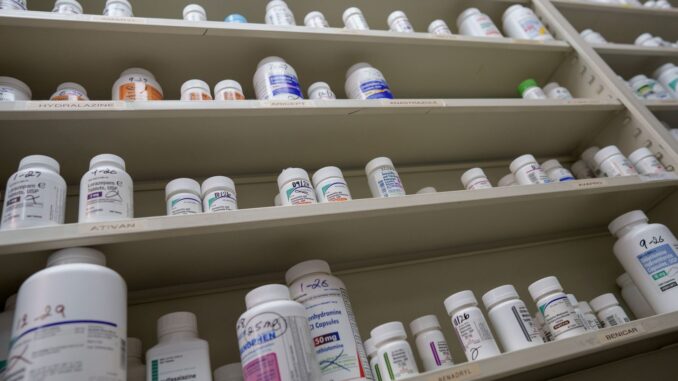
Main to remember
- President Donald Trump recently proposed A rate of up to 200% on foreigner medicine.
- Experts say that high prices on drugs could increase prices, insurance premiums and even lead to shortages.
- A 25% rate could increase the cost of certain $ 10,000 cancer drugs for a 24 -week course, an analysis revealed.
The prices offered by President Donald Trump on pharmaceutical products could cause higher prices, higher insurance premiums and even drug shortages, according to experts.
Trump triggered the latest speculation series this week when he said that his long -awaited prices on pharmaceutical products could be announced soon. He has already launched the idea of a 25% rate on pharmaceutical products, adding to the sprawling list of import taxes that he has already set up.
“Pharmaceutical products will probably be prices at the end of the month,” Trump told journalists on July 15 in a herd with a base Andrews. “And we will start with a low rate and give the pharmaceutical company about a year to build. And then we will make a very high price.”
Prices are intended to encourage pharmaceutical companies to make their products in the United States instead of the foreigner, which would make the United States less vulnerable to disturbances.
The calendar for a pharmaceutical rate remains troubled and “very high” could be very high indeed – Trump recently launched the idea of a 200% tariff on drugs. It would be his most steep import tax to date, but he said that this may not take effect for a year at 18 months.
Who will pay
Consumers will finally pay the price of prices, directly or indirectly, according to an analysis of a team of researchers led by Sean D. Sullivan, teacher of pharmacy at the University of Seattle, published in the Journal of Managed Care & Specialty Pharmacy This May.
Consumers would initially be protected by cost increases for many drugs, as prices are regulated by government programs like Medicare. In these cases, hospitals would be affected by the bill. But then, companies could increase the prices of private insurers, leading to higher insurance premiums, wrote Sullivan.
Companies that sell generic drugs to consumers generally have low beneficiary margins and should transmit most of the prices to their customers, Sullivan wrote.
The blow could be more important for certain drugs that are only made abroad. A 25% rate on pharmaceutical products would increase prices for certain cancer treatments from $ 8,000 to $ 10,000 for a 24 -week course, found an AG analysis.
Medication manufacturers who are unable to transmit the cost of prices to consumers can choose an even worse option: stop production or get out of the American market completely. This could lead to shortages, according to Marta E. Wosińska, main member of economic studies at Brookings Institution, a non -partisan reflection group.
Prices could even harm national manufacturers, as many pharmaceuticals manufactured in the United States use ingredients brought abroad and would cause import tax.
“The price pressure for manufacturers of national and foreign generics will test their already low margins, which will potentially lead to product stops or a reduction in costs that erodes quality,” wrote Wosińska in a March analysis.
Prices may not have their intentioned effect to encourage domestic production, wrote Sullivan.
“Pharmaceutical manufacturing is highly specialized, requiring significant capital investments, technological expertise and regulatory compliance,” he said. “The scaling up of domestic production, including the importation of ingredients from countries like China and India, to compensate for the disturbed foreign supply chains is often impractical and costly.”
Trump’s chronology
The financial markets are allowed to speculate on the height of a price and when it is set up. Goldman Sachs economists led by Jan Hatzius said the prices would probably start low and then increased after the mid-term elections of 2026 because they could be unpopular to the public.
“We assume that most of the pharmaceutical rates will be delayed until January 2027, despite the risk that a lower rate is implemented on certain short -term pharmaceutical imports,” Hatzius wrote in a comment.
